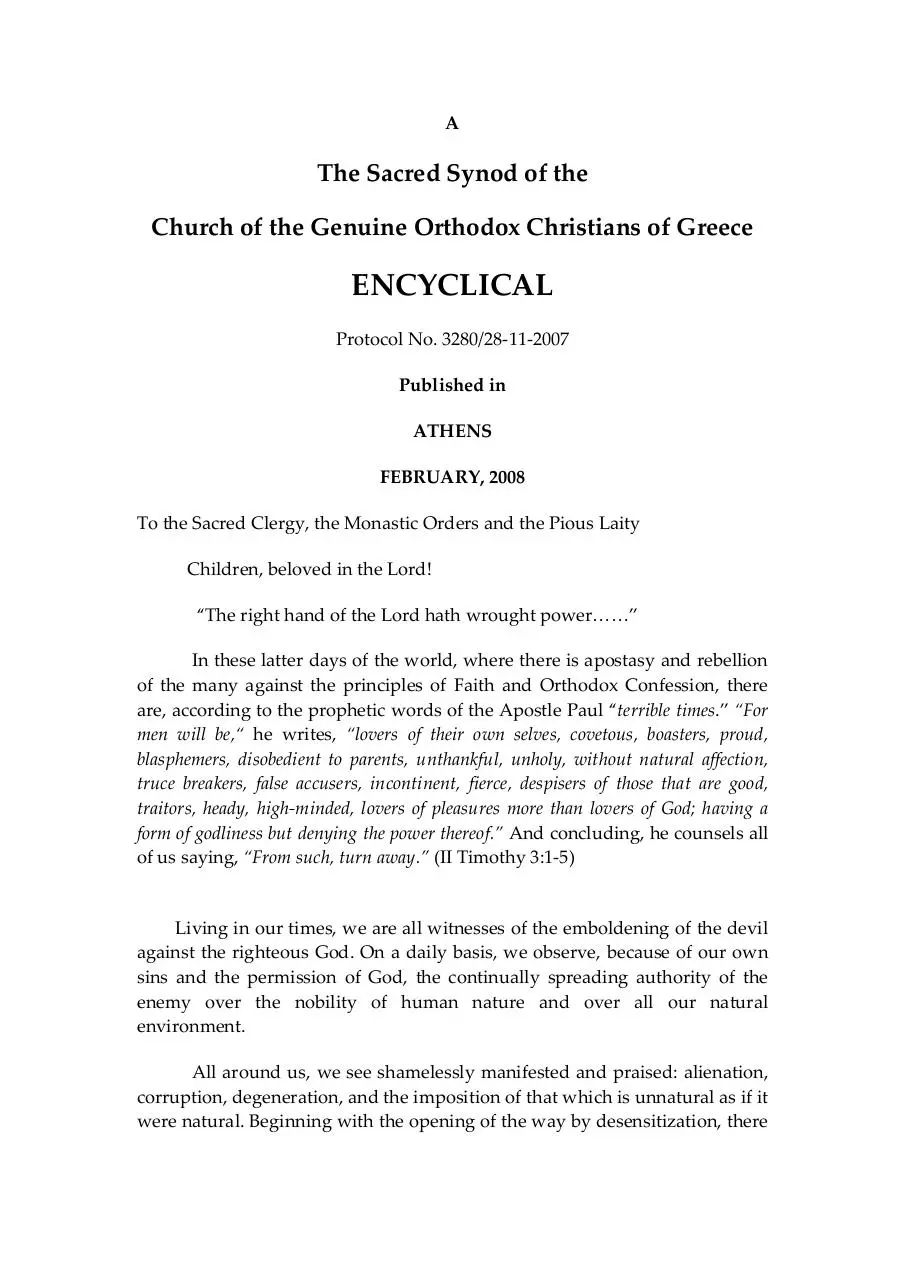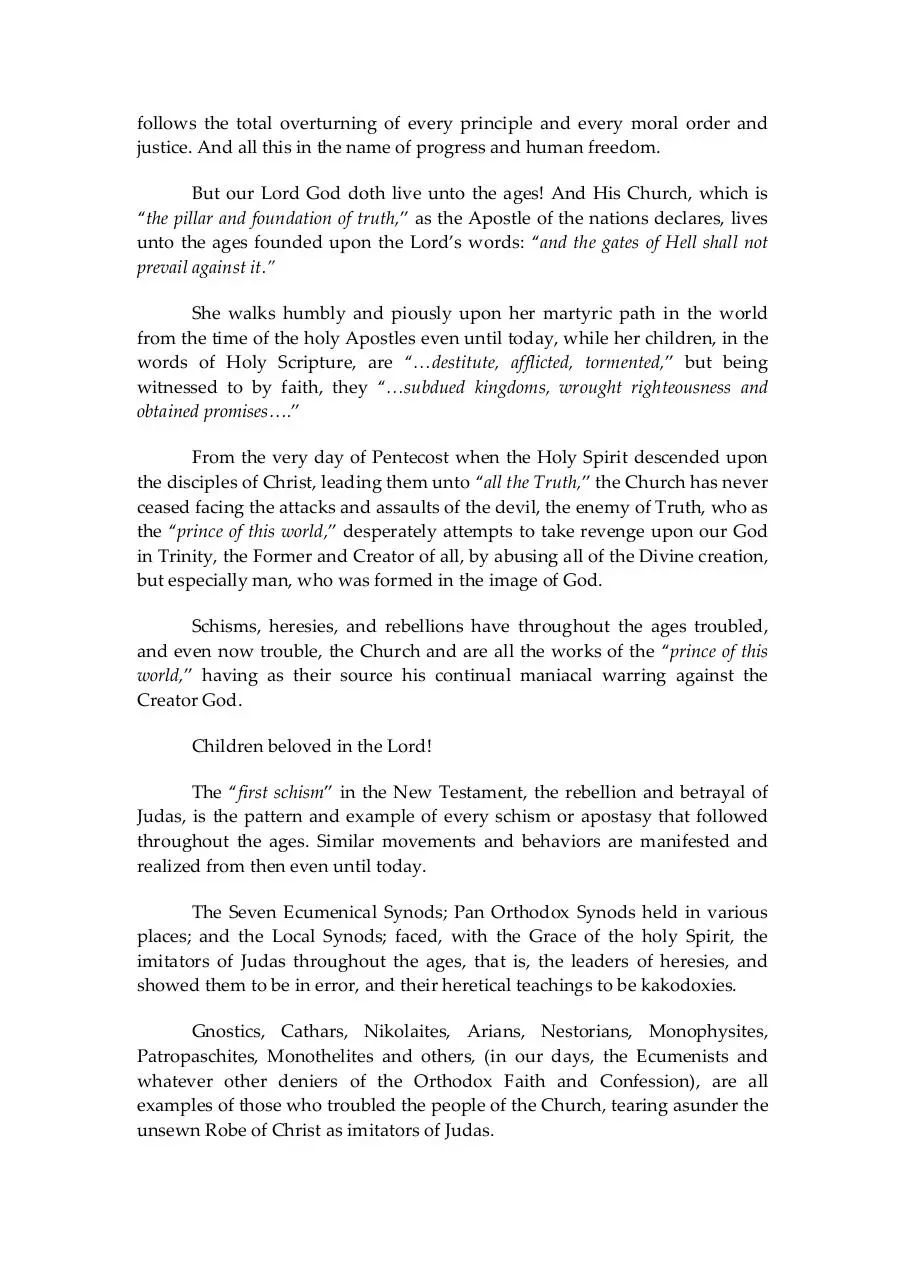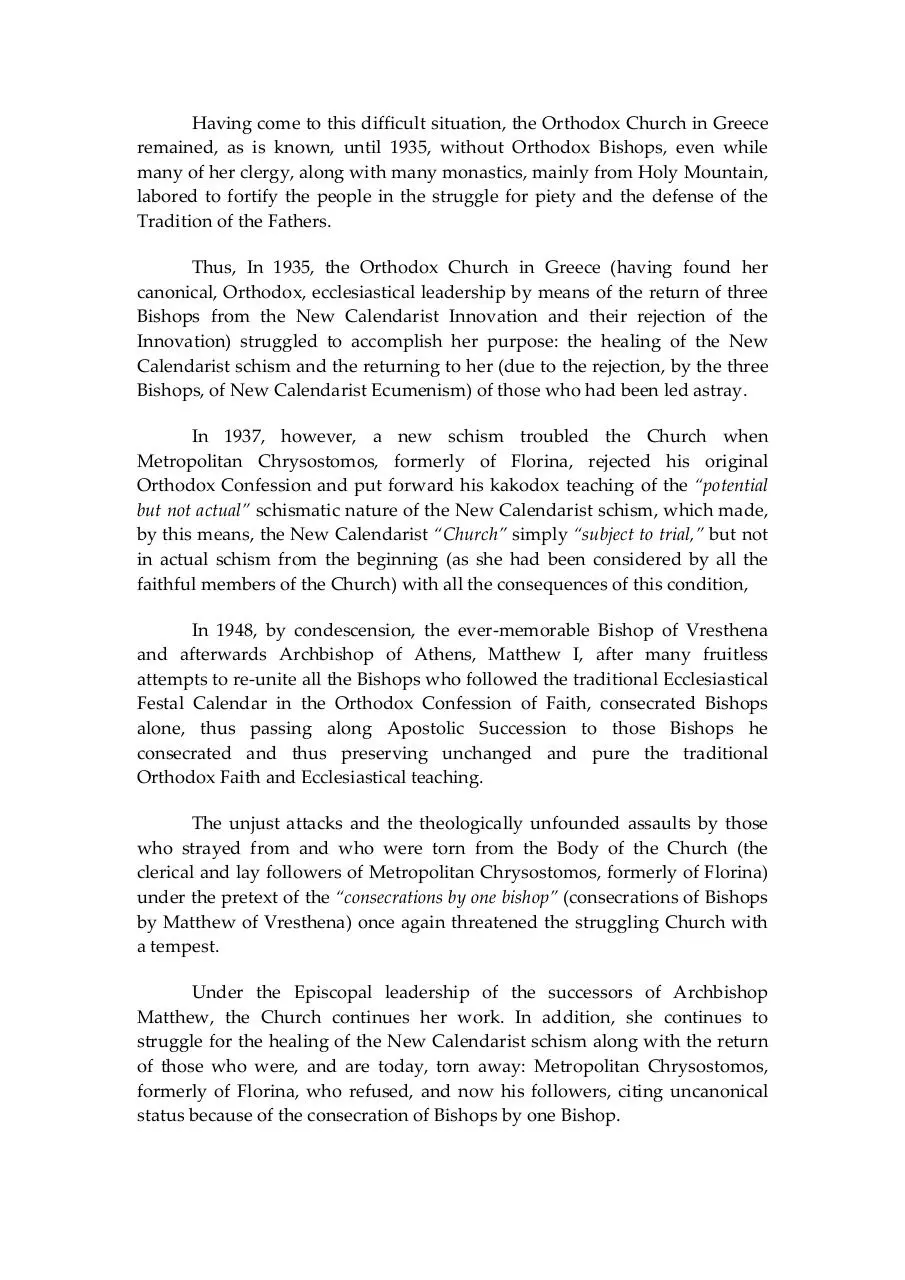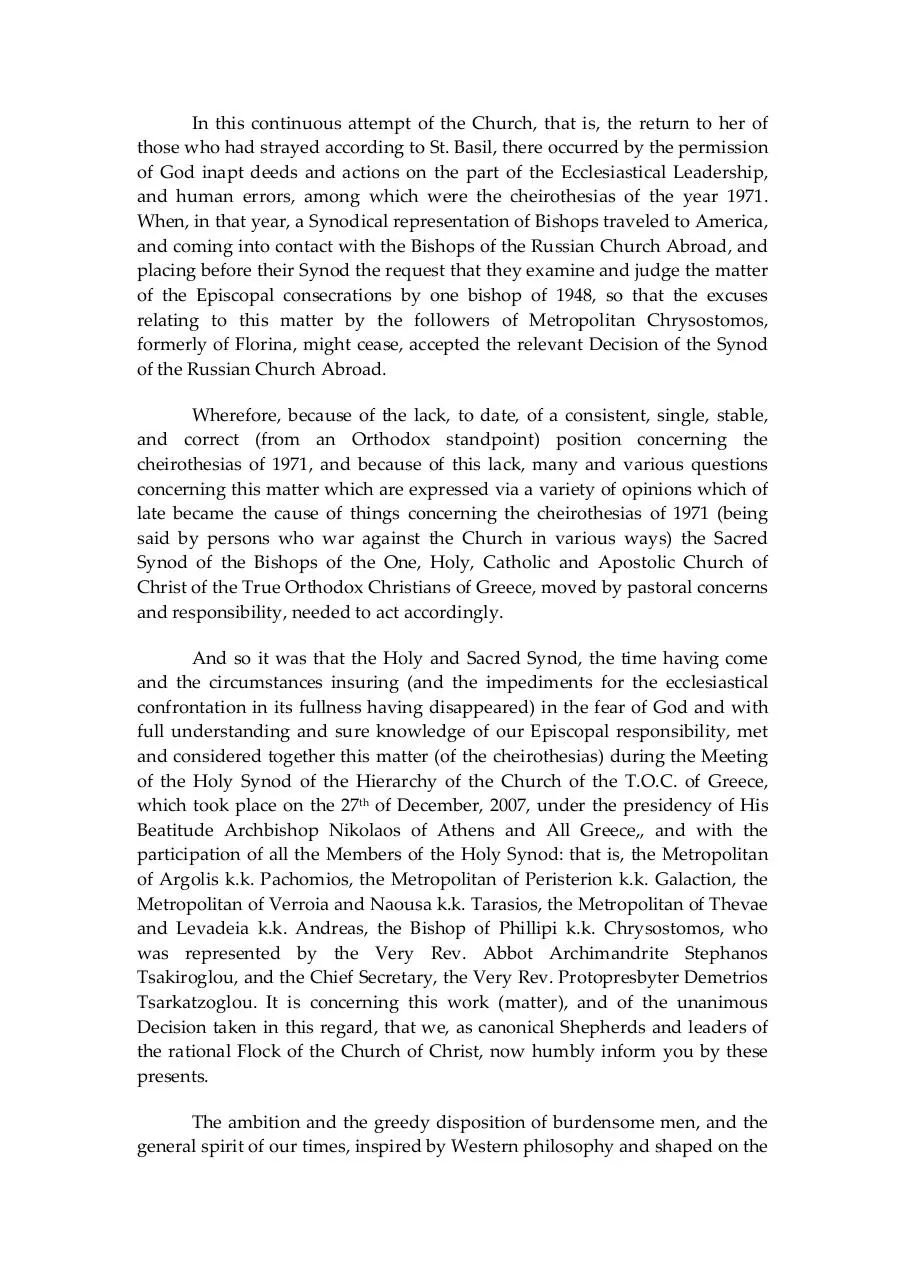Encyc2007eng (PDF)
File information
Title: A
Author: Stavros
This PDF 1.4 document has been generated by Acrobat PDFMaker 8.1 for Word / Acrobat Distiller 8.1.0 (Windows), and has been sent on pdf-archive.com on 23/09/2014 at 09:24, from IP address 46.176.x.x.
The current document download page has been viewed 616 times.
File size: 291.78 KB (19 pages).
Privacy: public file





File preview
A
The Sacred Synod of the
Church of the Genuine Orthodox Christians of Greece
ENCYCLICAL
Protocol No. 3280/28‐11‐2007
Published in
ATHENS
FEBRUARY, 2008
To the Sacred Clergy, the Monastic Orders and the Pious Laity
Children, beloved in the Lord!
“The right hand of the Lord hath wrought power……”
In these latter days of the world, where there is apostasy and rebellion
of the many against the principles of Faith and Orthodox Confession, there
are, according to the prophetic words of the Apostle Paul “terrible times.” “For
men will be,“ he writes, “lovers of their own selves, covetous, boasters, proud,
blasphemers, disobedient to parents, unthankful, unholy, without natural affection,
truce breakers, false accusers, incontinent, fierce, despisers of those that are good,
traitors, heady, high‐minded, lovers of pleasures more than lovers of God; having a
form of godliness but denying the power thereof.” And concluding, he counsels all
of us saying, “From such, turn away.” (II Timothy 3:1‐5)
Living in our times, we are all witnesses of the emboldening of the devil
against the righteous God. On a daily basis, we observe, because of our own
sins and the permission of God, the continually spreading authority of the
enemy over the nobility of human nature and over all our natural
environment.
All around us, we see shamelessly manifested and praised: alienation,
corruption, degeneration, and the imposition of that which is unnatural as if it
were natural. Beginning with the opening of the way by desensitization, there
follows the total overturning of every principle and every moral order and
justice. And all this in the name of progress and human freedom.
But our Lord God doth live unto the ages! And His Church, which is
“the pillar and foundation of truth,” as the Apostle of the nations declares, lives
unto the ages founded upon the Lord’s words: “and the gates of Hell shall not
prevail against it.”
She walks humbly and piously upon her martyric path in the world
from the time of the holy Apostles even until today, while her children, in the
words of Holy Scripture, are “…destitute, afflicted, tormented,” but being
witnessed to by faith, they “…subdued kingdoms, wrought righteousness and
obtained promises….”
From the very day of Pentecost when the Holy Spirit descended upon
the disciples of Christ, leading them unto “all the Truth,” the Church has never
ceased facing the attacks and assaults of the devil, the enemy of Truth, who as
the “prince of this world,” desperately attempts to take revenge upon our God
in Trinity, the Former and Creator of all, by abusing all of the Divine creation,
but especially man, who was formed in the image of God.
Schisms, heresies, and rebellions have throughout the ages troubled,
and even now trouble, the Church and are all the works of the “prince of this
world,” having as their source his continual maniacal warring against the
Creator God.
Children beloved in the Lord!
The “first schism” in the New Testament, the rebellion and betrayal of
Judas, is the pattern and example of every schism or apostasy that followed
throughout the ages. Similar movements and behaviors are manifested and
realized from then even until today.
The Seven Ecumenical Synods; Pan Orthodox Synods held in various
places; and the Local Synods; faced, with the Grace of the holy Spirit, the
imitators of Judas throughout the ages, that is, the leaders of heresies, and
showed them to be in error, and their heretical teachings to be kakodoxies.
Gnostics, Cathars, Nikolaites, Arians, Nestorians, Monophysites,
Patropaschites, Monothelites and others, (in our days, the Ecumenists and
whatever other deniers of the Orthodox Faith and Confession), are all
examples of those who troubled the people of the Church, tearing asunder the
unsewn Robe of Christ as imitators of Judas.
But the Church of Christ lives unto the ages!
However, it is natural and understandable that every heresy, every
ecclesiastical schism or separation that sprouted forth, brought difficult times
to the peace, like‐mindedness, and unity of the members of the Church.
The harmony, concerning God, of those who are sincere in their
relationship to God, that is, the Orthodox Confession of the members of the
Church, is threatened by the disagreement and the battling evoked by those
who do not have an Orthodox Confession, that is, by those members of the
Church who act insincerely toward God, in opposition to the Orthodox
Confession which they held up to now. And, as we are informed by St.
Gregory the Theologian: “Nothing is mightier for the harmony of those who are
sincere toward God as their agreement in Godly matters. And nothing creates
antagonism like disagreement in this matter.” (Sermon VI Eirenical I).
But while the Church receives attacks and wounds from those who
deny the Truth, and even while many of her children distance themselves and
fall from the Truth, she, herself, as the Body of Christ, remains unto the ages.
According to St. John Chrysostomos, “… being warred against, she is victorious;
plotted against, she prevails; being cursed, she is made even more brilliant; she
receives wounds, but does not succumb to the ulcers; she is battered by waves but does
not sink; she is tempest tossed, but suffers not shipwreck; she wrestles, but is not
beaten; stricken by fists, but is not crushed….” (Second Homily To Eutropios) Yet,
all the while, she struggles and uses every means, and tries in every way to
return to her all who have been beguiled into error from the Truth and
Tradition of Orthodoxy.
All of this is true, because the work of the Church in the world is the
revelation of the will of God unto mankind and its participation in the eternal
life and the Kingdom. In addition, she works for the gathering of those who
are scattered and the return of those who have strayed from the path of Truth.
As we read in the prayer of the Anaphora of the Divine Liturgy of St. Basil the
Great: “… gather up those who are scattered, restore those who have strayed and
unite them to the Holy and Apostolic Church …”
The Holy Church experienced a tempest in our times when, in 1924,
the Ecumenical Patriarchate; the local Church of Greece; and, in consequence,
other Patriarchates and local Orthodox Churches, accepted the introduction of
the New Papal Calendar and its imposition upon the Ecclesiastical Festal
Calendar as the first step to the pan‐heresy of Ecumenism.
Having come to this difficult situation, the Orthodox Church in Greece
remained, as is known, until 1935, without Orthodox Bishops, even while
many of her clergy, along with many monastics, mainly from Holy Mountain,
labored to fortify the people in the struggle for piety and the defense of the
Tradition of the Fathers.
Thus, In 1935, the Orthodox Church in Greece (having found her
canonical, Orthodox, ecclesiastical leadership by means of the return of three
Bishops from the New Calendarist Innovation and their rejection of the
Innovation) struggled to accomplish her purpose: the healing of the New
Calendarist schism and the returning to her (due to the rejection, by the three
Bishops, of New Calendarist Ecumenism) of those who had been led astray.
In 1937, however, a new schism troubled the Church when
Metropolitan Chrysostomos, formerly of Florina, rejected his original
Orthodox Confession and put forward his kakodox teaching of the “potential
but not actual” schismatic nature of the New Calendarist schism, which made,
by this means, the New Calendarist “Church” simply “subject to trial,” but not
in actual schism from the beginning (as she had been considered by all the
faithful members of the Church) with all the consequences of this condition,
In 1948, by condescension, the ever‐memorable Bishop of Vresthena
and afterwards Archbishop of Athens, Matthew I, after many fruitless
attempts to re‐unite all the Bishops who followed the traditional Ecclesiastical
Festal Calendar in the Orthodox Confession of Faith, consecrated Bishops
alone, thus passing along Apostolic Succession to those Bishops he
consecrated and thus preserving unchanged and pure the traditional
Orthodox Faith and Ecclesiastical teaching.
The unjust attacks and the theologically unfounded assaults by those
who strayed from and who were torn from the Body of the Church (the
clerical and lay followers of Metropolitan Chrysostomos, formerly of Florina)
under the pretext of the “consecrations by one bishop” (consecrations of Bishops
by Matthew of Vresthena) once again threatened the struggling Church with
a tempest.
Under the Episcopal leadership of the successors of Archbishop
Matthew, the Church continues her work. In addition, she continues to
struggle for the healing of the New Calendarist schism along with the return
of those who were, and are today, torn away: Metropolitan Chrysostomos,
formerly of Florina, who refused, and now his followers, citing uncanonical
status because of the consecration of Bishops by one Bishop.
In this continuous attempt of the Church, that is, the return to her of
those who had strayed according to St. Basil, there occurred by the permission
of God inapt deeds and actions on the part of the Ecclesiastical Leadership,
and human errors, among which were the cheirothesias of the year 1971.
When, in that year, a Synodical representation of Bishops traveled to America,
and coming into contact with the Bishops of the Russian Church Abroad, and
placing before their Synod the request that they examine and judge the matter
of the Episcopal consecrations by one bishop of 1948, so that the excuses
relating to this matter by the followers of Metropolitan Chrysostomos,
formerly of Florina, might cease, accepted the relevant Decision of the Synod
of the Russian Church Abroad.
Wherefore, because of the lack, to date, of a consistent, single, stable,
and correct (from an Orthodox standpoint) position concerning the
cheirothesias of 1971, and because of this lack, many and various questions
concerning this matter which are expressed via a variety of opinions which of
late became the cause of things concerning the cheirothesias of 1971 (being
said by persons who war against the Church in various ways) the Sacred
Synod of the Bishops of the One, Holy, Catholic and Apostolic Church of
Christ of the True Orthodox Christians of Greece, moved by pastoral concerns
and responsibility, needed to act accordingly.
And so it was that the Holy and Sacred Synod, the time having come
and the circumstances insuring (and the impediments for the ecclesiastical
confrontation in its fullness having disappeared) in the fear of God and with
full understanding and sure knowledge of our Episcopal responsibility, met
and considered together this matter (of the cheirothesias) during the Meeting
of the Holy Synod of the Hierarchy of the Church of the T.O.C. of Greece,
which took place on the 27th of December, 2007, under the presidency of His
Beatitude Archbishop Nikolaos of Athens and All Greece,, and with the
participation of all the Members of the Holy Synod: that is, the Metropolitan
of Argolis k.k. Pachomios, the Metropolitan of Peristerion k.k. Galaction, the
Metropolitan of Verroia and Naousa k.k. Tarasios, the Metropolitan of Thevae
and Levadeia k.k. Andreas, the Bishop of Phillipi k.k. Chrysostomos, who
was represented by the Very Rev. Abbot Archimandrite Stephanos
Tsakiroglou, and the Chief Secretary, the Very Rev. Protopresbyter Demetrios
Tsarkatzoglou. It is concerning this work (matter), and of the unanimous
Decision taken in this regard, that we, as canonical Shepherds and leaders of
the rational Flock of the Church of Christ, now humbly inform you by these
presents.
The ambition and the greedy disposition of burdensome men, and the
general spirit of our times, inspired by Western philosophy and shaped on the
anvil of impiety and the denial of our God, were the motivational power
behind those who attacked ecclesiastical piety; who by many and various
excuses acted and succeeded in the imposition of New Calendarism as the
first step of the already planned‐upon and since applied (as is provided for by
the (Ecumenical) Patriarchal Encyclical of 1920)) pan‐heresy of Ecumenism,
which, for reasons God alone knows, was followed by all the Bishops of the
Church of Greece.
Thus, the Church of Greece which was left orphaned of Orthodox
Bishops in 1924, after 11 years, in 1935 acquires once again canonical
ecclesiastical leadership in the persons of the three Bishops who returned
from the Innovation and confessed Orthodoxy; that is, Metropolitan
Chrysostomos Demetriou of Zakynthos, Metropolitan Chrysostomos
Kavouridis formerly of Florina, and Metropolitan Germanos Mavromatis of
Demetrias, who also consecrated four Bishops to form a canonical Holy
Synod, among whom was the Athonite Hieromonk Matthew Karpathakis,
who was canonically consecrated Bishop of Vresthena.
Therefore, his consecration, as well as those he performed in 1948,
proceeds in succession from the Holy Apostles and their successors, the
Orthodox canonical Bishops of the One, Holy, Catholic and Apostolic Church.
And all the Episcopal consecrations of Bishops of the Church of Christ (which
is called in these times the Church of the T.O.C. or True Orthodox Church to
distinguish her from the Innovating Church) in Greece, up until now (given
indeed that no other Bishop, not of those who returned in 1935, nor of those
four who were consecrated in that same year, performed consecrations in
Greece) draw their succession in these latter times from the aforementioned
Consecrations of 1935 and those performed in the year 1948 by the Confessor
of Orthodoxy, the ever‐memorable Archbishop of Athens, Matthew (+1950).
And without question, the Episcopal consecrations which were
performed in 1948 by the then Bishop of Vresthena and later Archbishop of
Athens, Matthew (the first of which he performed alone) are considered to be
(and are, indeed, from a dogmatic and ecclesiological point of view) complete
and genuine, in so far as the grace and authority of the episcopate was
transmitted.
We say this despite the noted transgression, or rather deviation, from
the order provided for by the sacred canons concerning the participation of at
least two or three bishops at the consecration of a bishop, taking into account
the ecclesiastical situation then: that is, on the one hand the refusal of the
bishops in Greece, who followed the traditional calendar, (Metropolitans
Chrysostomos formerly of Florina and Germanos of the Cyclades Islands), to
act together with him (under the condition that they would have previously
been in harmony as regards Orthodox Confession) in the Consecration of
Bishops. Bishop Matthew responsibly urged these ordinations for the good of
the Church and the salvation of the faithful, even though and despite his
advanced age he continued to struggle mightily for the Orthodox Confession;
and on the other hand the stubborn clinging of the aforementioned two
bishops in supporting kakodox positions and theories and the unquestionable
ecclesiastical need, in the midst of this situation, of the assurance of the
Apostolic succession of the episcopate.
This, in retrospect, has been clearly certified by the consequences (of
the consecrations) to the point that, today, those consecrations are considered
of the greatest importance for the Church of Greece and even beyond,
relevant to the Struggle of True Orthodox against the Innovation of New
Calendarism and the Pan Heresy of Ecumenism.
The cheirothesias which occurred in 1971, under whatever form and
meaning they took place, and under whatever interpretation they might be
viewed, according to the faith of the True Orthodox Church of Greece and
indeed in the conscience of her ecclesiastical flock, neither added to, nor
completed, anything to the validity, to the fullness, to the grace, or to the
power of the Episcopate of the Bishops of the Church of the T.O.C. of Greece;
and further, from a strictly canonical point of view, it should never have even
occurred, because Bishops consecrated by one Bishop according to the
canonical order of the Church are either recognized by her, or they are
condemned and punished; since they are considered, in one way or the other,
as Bishops having the fullness of the Episcopate from their very consecration.
“Cheirothesia” performed upon Orthodox clergy is not provided for at
all, nor is it permitted under any interpretation whatsoever. In the practice of
the Church, cheirothesia was implemented only upon schismatics to validate
the invalidly performed mystery of their ordination. Even if understood as a
blessing or a simple prayer, cheirothesia means a vitalization and validation
of those things performed invalidly by heretics or schismatics. (See Canon VIII
of the First Ecumenical Synod, the Letter of the First Ecumenical Synod to Alexander
of Alexandria, Act I of the Seventh Ecumenical Synod, and the relevant
commentary of St. Nikodemos in the Rudder.)
Consequently, in order for the relevant Decision of the Synod of the
Russian Church Abroad (Prot. No. 16‐II/15)28‐9‐1971) concerning the Bishops
consecrated by the Bishop of Vresthena in 1948 (by which the “cheirothesia”
upon the Bishops of Corinth Callistos and Kition Epiphanios was decided) to
be within the limits of canonicity, it was necessary for it (the ROCOR Synod,
trans. note) to choose theoretically between only two choices, either of which
required indispensable canonical foundation for either choice. Either there is
the simple recognition, as consecrations performed by oikonomia because of
real and unquestionable necessity, or condemnation and punishment as
inexcusably (the consecrations) performed, together with the appropriate
ecclesiastical penalty, and nothing further.
In this case, the Synod of the Russian Orthodox Church Abroad should
have, if it was to judge justly on the basis of the divine and sacred Canons (the
practice of the Church, and the historical conditions and circumstances of that
particular ecclesiastical period) recognized these consecrations as
dogmatically complete, and as certainly neither wanting nor needing
anything further. Instead, as it is known, the aforementioned Synod,
accepting and receiving suggestions and pressures of third parties, especially
from the Auxentian party (as is obvious from the very text of the Decision),
made its choices and decided upon this altogether anticanonical and
unfounded decision concerning the cheirothesias of the aforementioned
Bishops.
Therefore, as canonical Shepherds of the Church of Christ, with
understanding of our responsibility, and humbly accepting the paternal
advice of that Atlas of Orthodoxy, St. Mark of Ephesus, according to whom:
”No ecclesiastical matter was ever set aright by compromise, for between
truth and falsehood there is nothing,” we unanimously declare that: The
actions and deeds of that period, (which occurred in the context of the effort
of the Church for union within the Church and the healing of schisms,
[especially that of the followers of Metropolitan Chrysostomos formerly of
Florina, the leaders of whom, on the pretext of the “consecration by one bishop,”
gave this (“consecration”) as the excuse against union, and among which
actions is the cheirothesia which was based upon an unacceptable and most
condemnable (from an ecclesiastical and canonical point of view) Synodal
Decision; as well as the previous to this hasty entering into communion with
the Russian Church Abroad without the required canonical presuppositions
and guarantees, and the acceptance of her as Judge in our ecclesiastical
matters, but especially the subsequent acceptance in Greece of the
aforementioned Synodal Decision of the Russian Church Abroad1, and the
application subsequently of this Decision’s requirement of “cheirothesia”
of the rest of the Members of the Holy Synod) were, and are, adjudged
ERRONEOUS, and as such are condemned and rejected.
The Holy Synod, with the very same Faith and Confession which she had
from the beginning concerning the Episcopal Consecrations of 1948, (by
which Apostolic Succession was assured) has even, up until today,
consecrated her Bishops; and again, whenever she judges it needful, she will
proceed to elect and consecrate new Bishops for the further strengthening and
progress of the work of the Church of Greece, which, by Divine Grace, she
preserves unchanged the sacred Deposit and especially the Apostolic
Succession unsullied, these two characteristics of the Church of Christ, are
indeed the necessary presuppositions of the salvation in Christ of the faithful
within the Church.
Concerning the Decision of the Bishops to refer the matter of the
ordination by one Bishop of the ever‐memorable Hierarch and Confessor of
Orthodoxy Matthew, to the Synod of the Bishops of the Russian Church
Abroad, it must be clarified that there was never any doubt or ambivalence on
their part concerning the validity and fullness of these ordinations, but only of
the theoretical recognition, and this as the result of a healthy ecclesiastical
mentality of an ecclesiastical “being subject to trial” before the appropriate
ecclesiastical body for judgment and investigation if, and to what extent (the
ordinations by one Bishop) were, or were not, justified. And even this, not
because there was any ambivalence on our part, but chiefly as an expression
of the concern of the Church for those outside of Her who followed the
traditional Calendar, but who used, as reasons, such things as excuses and
justifications for the continuation of schisms and divisions among them, in
order precisely to heal these very schisms. This desire was not expressed
willy‐nilly, from time to time, but formally and Synodically. It was expressed
clearly and in documents (among other times) by the Pastoral Encyclical of
the Holy Synod on March 1, 1957, which, it must be noted, was signed (along
with the other signatory member Bishops) by the four Bishops who were
consecrated in 1948 by the ever‐memorable Archbishop Matthew, where,
among other matters, the following is mentioned:
“…And the portion of those who disagree, being led astray and leading others
to stray, causes division by preaching that the Bishops not be recognized because of
the taking place of the supposedly anticanonical consecration of a Bishop by one
Bishop.
“Children beloved in the Lord,
“This refusal to recognize is an error; it is an excuse for division. It has been
witnessed scientifically and historically that dogmatically the consecration is valid.
Dogmatically, the Bishops are in order. They are Bishops having the fullness of
Episcopal authority. The matter is solved. For the sake of ecclesiastical order from the
standpoint of administration in this matter the question is judgeable before the
appropriate Synod for investigation if the consecration was justified, and if it was not,
then the application of the appropriate penalties. Therefore there might be some
Download Encyc2007eng
Encyc2007eng.pdf (PDF, 291.78 KB)
Download PDF
Share this file on social networks
Link to this page
Permanent link
Use the permanent link to the download page to share your document on Facebook, Twitter, LinkedIn, or directly with a contact by e-Mail, Messenger, Whatsapp, Line..
Short link
Use the short link to share your document on Twitter or by text message (SMS)
HTML Code
Copy the following HTML code to share your document on a Website or Blog
QR Code to this page

This file has been shared publicly by a user of PDF Archive.
Document ID: 0000185279.